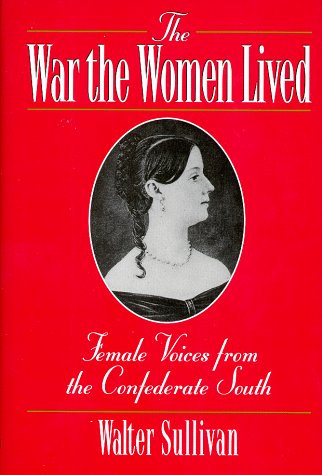There is nothing so painfully ironic as a war between countrymen. So when nurse Kate Cumming speaks bitterly in her 1864 diary of “our kind northern friends, who love us so dearly that they will have us unite with them, whether we will or no” it is hard to blame her.
Cumming is one of 23 Southern women whose memoirs and diaries Walter Sullivan, an English professor at Vanderbilt University, has collected in this anthology. The authors range from Mary Boykin Miller Chestnut, wife of U.S. Senator James Chestnut of South Carolina, to the spy Belle Boyd of Virginia, arrested first at 19, to Céline Frémaux of Louisiana, who was only ten when the war began. There are many wonderful stories here, some very moving. Several of these women were, like Mary Chestnut, from wealthy families; all were ruined by the war. By 1864, Céline Frémaux was so poor that her family made their own shoes—using cartridge boxes and belts for the soles, and velvet from an old hunting suit for the uppers. Sewn together with copper wire, these shoes would last for seven or eight wearings—enough for a month or two of church.
In that same year in Georgia, in the wake of Sherman’s Army, Mary Ann Harris Gay traveled unescorted from Decatur to Social Circle—a dangerous trip at the time. In her first two days traveling she saw no living animal, not even a bird, other than a dog guarding the ruins of a house burnt to the ground. When she returned to Decatur, she was met by women and children who ran after her and begged for something to eat.
Other women besides Mrs. Gay showed great courage. After Richmond fell in 1865, Phoebe Yates Pember continued to nurse her soldiers under occupation. Frustrated one day to find her stores of food had been commandeered by the Union soldiers, she went to the commissary and, to the guards’ astonishment, simply pushed aside their bayonets and unlocked the door. She then filled her basket, “with an explanation to them that I could be arrested whenever wanted at my quarters.” (She was allowed to nurse and feed her patients until there were none left.)
Some of these women write very well, and most of the rest write simply and clearly—only the lady spies are guilty of penny-dreadful prose, and their stories are still entertaining, if not always credible. Sullivan has helped his authors (and readers) bv silently editing out political commentary and family details he found less interesting. He has also quoted selections that are generally longer than those found in similar anthologies, and quoted several women two or three times, so that you get a real feeling for their characters and circumstances. This is the case with Phoebe Pember, and with Mary Jones and her daughter, Mary Mallard, whose twin diaries tell one of the most powerful stories in the book.
In late 1864, Mrs. Jones and Mrs. Mallard were living with a friend, Kate King, and five children on one of the Jones’ estates near Savannah. The diaries cover the month Sherman’s Army came through, December 1864 to January 1865. During this time the women were robbed of their food and possessions (as were their slaves), had their house frequently invaded, were cursed and insulted, and sometimes threatened with death or fire. One soldier took their well chain, telling the women they had no right even to water. Mrs. Mallard writes that her male slaves had to stay home with their wives to keep them safe from assault, and there was one night when the white women, too, were told by a servant that they were in danger. They prayed and then sat sleepless in the dark, finding in the morning that a Union soldier had taken it upon himself to guard them. Mary Mallard, who was pregnant, finally had her daughter on January 4, while a hundred Union soldiers yelled and cursed in the yard.
In an entry dated January 7, when the worst was over, Mary Jones examined her conscience and then wrote, “I never failed to let them know that before High Heaven I believed our cause was just and right. The isolated and utterly defenseless condition of my poor family compelled me often to use entreaties; but after the day was over I frequently inquired of Kate and Daughter; Tell me, girls, did I act like a coward?'”
Mrs. Jones’ emotion makes the war feel very real, and very recent. This is the virtue of a well-chosen anthology: in it we have a chance to hear the people who lived through a great event tell their own tales, in their own way, with an immediacy that even the best third-party history cannot have.
[The War the Women Lived: Female Voices from the Confederate South, Edited by Walter Sullivan (Nashville: J.S. Sanders & Company) 319 pp., $24.95]

Leave a Reply